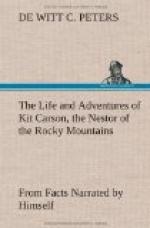This river is nearly east from Taos; and the point at which Carson anticipated overhauling the party was between two and three hundred miles distant. At this time, the Mountain Indians were unusually hostile; but Kit Carson was always well informed of their movements—as much so as it was in the power of any one to be. With the little command under him he was willing, where so weighty a matter as saving the lives of two of his countrymen demanded his services, to march anywhere—even if he had to contest his way. One hour was sufficient time for him to make ready for the undertaking, but not so with the soldiers. They had to put their horses and themselves in trim, for it might be severe and taxing duty. The route taken by the party was a trail, which leads direct to Rayado, and on which, just before reaching the last-named place, there are many curious piles of stones, which are scattered over the side of a mountain, and have formed a puzzle to many an inquiring mind. By some they are supposed to be Indian graves; but, by others, they are thought to have been made as a sort of landmark by the older inhabitants of the plains, when they started into New Mexico on some marauding incursion. These latter persons believe that the Indians were unacquainted with the country they were invading, and had left these marks to assist them in making their way out again. Most likely the first hypothesis is true, and that the stones were thus heaped up to protect the corpses from being devoured by the wolves. On quitting Rayado Kit Carson struck out on the open prairies.
By making an expeditious march, Kit Carson felt that the traders could yet be saved. His party consisted of ten picked men of the dragoons, and it was splendidly mounted on horses furnished him to assist in the undertaking. The pace which Kit commanded and required was one which would try the nerves and courage of most good horsemen. Onward, over the level prairie, the party galloped—every man feeling proud of the guide, whose spirit they caught and imitated. The second night out from Taos they came upon the camp of a detachment of United States recruits who were under the command of Captain Ewell, and who were bound for New Mexico, where they were to reinforce the regiments of the army which were stationed in that territory.
It is customary to send out, each year, detachments of recruits to the different departments of the West. These men are enlisted and collected at the depots within the States; and, whenever a sufficient force is collected to fill up the requisitions, they are dispatched, at the proper seasons, to their respective regiments. Those intended for New Mexico set out during the summer months. They are rarely sent at the same time, or as the same command of men. These recruits are a hard set to manage, especially when traveling through the States, where they are exposed to temptation. On arriving at the commencement of their hardships, on the plains, it is usually found




